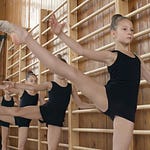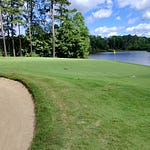This past month, a lot of my clients teed it up in some of the biggest tournaments of their careers. US Junior Amateur, US Amateur, D1 qualifiers, US Open qualifiers, and professional tour events.
Every single one of them said some version of the same thing before the event:
“I just really want to play well.”
That desire is normal. But here’s the catch: when the event feels big, we often start protecting instead of playing. We play not to lose instead of playing to win.
It’s like the tournament suddenly sits on a pedestal. Because it matters so much, the brain kicks into defensive mode: don’t hit it in the water… don’t miss this putt… don’t mess up now.
And you already know the problem with that kind of self-talk. The brain doesn’t process the word don’t very well. Daniel Wegner, a psychology researcher, showed this in his famous “white bear” study. When people were told don’t think about a white bear, they actually thought about white bears more often.
Golf works the same way. If you keep telling yourself “don’t miss left,” your brain instantly paints a vivid picture of missing left. And that’s exactly where your attention — and sometimes your swing — goes.
Rachel’s Story
Rachel is a Division I player who recently transferred schools. Big move. New teammates. New coach. And right away, she had to play a qualifier to earn her spot in the lineup.
The first day didn’t go as planned. She came off the course frustrated and said,
“I just wanted it so badly… I felt like I had to prove myself. Every hole I kept thinking, ‘don’t screw this up.’ And then I played tight.”
That’s when I slowed her down and started asking questions, not giving answers. I wanted her to uncover the shift herself. Here’s how that sounded:
“What were you focused on most during those rounds — what you wanted to do, or what you wanted to avoid?”
“If I asked you to describe your targets, could you tell me the exact picture you had in your mind before each shot?”
“When you told yourself ‘don’t screw it up,’ what image popped into your head?”
“What would it look like if you flipped that script — and told yourself exactly what you wanted to do instead?”
Through that back-and-forth, Rachel started realizing the pattern herself. She wasn’t playing golf. She was playing defense against her own fears.
On day two, she went in with a different approach. Instead of “don’t hit it in the bunker,” she committed to “start it at the right center of the green.” Instead of “don’t leave it short,” she said, “roll it to the back of the cup.”
She described it best after the round:
“I wasn’t protecting anymore. I was swinging to my targets. It felt freer.”
Offense vs. Defense
That’s the difference between defense and offense in golf.
Defense is about avoiding mistakes.
Offense is about committing to what you want to do.
Psychologist Carol Dweck’s research on mindset shows that approach-oriented goals (what you want to achieve) lead to better performance and resilience than avoidance-oriented goals (what you’re trying not to do).
Rachel lived that lesson. The tournament didn’t shrink in importance, but her focus shifted. She stopped playing to avoid failure and started playing to create shots.
And that’s the key. You perform your best when you’re free, not when you’re protecting.
So the next time you step onto the tee in a big event, ask yourself:
Am I playing defense, hoping not to mess up?
Or am I playing offense, fully committed to my target?
Play offense. That’s where your best golf lives.
Your Mental Coach,
Dr. Mat
P.S. You are invited to one of the biggest virtual events I will be hosting since leaving NASA. At this event, I will be giving away something very special and I can’t wait to share it with you.
To register, click here:











